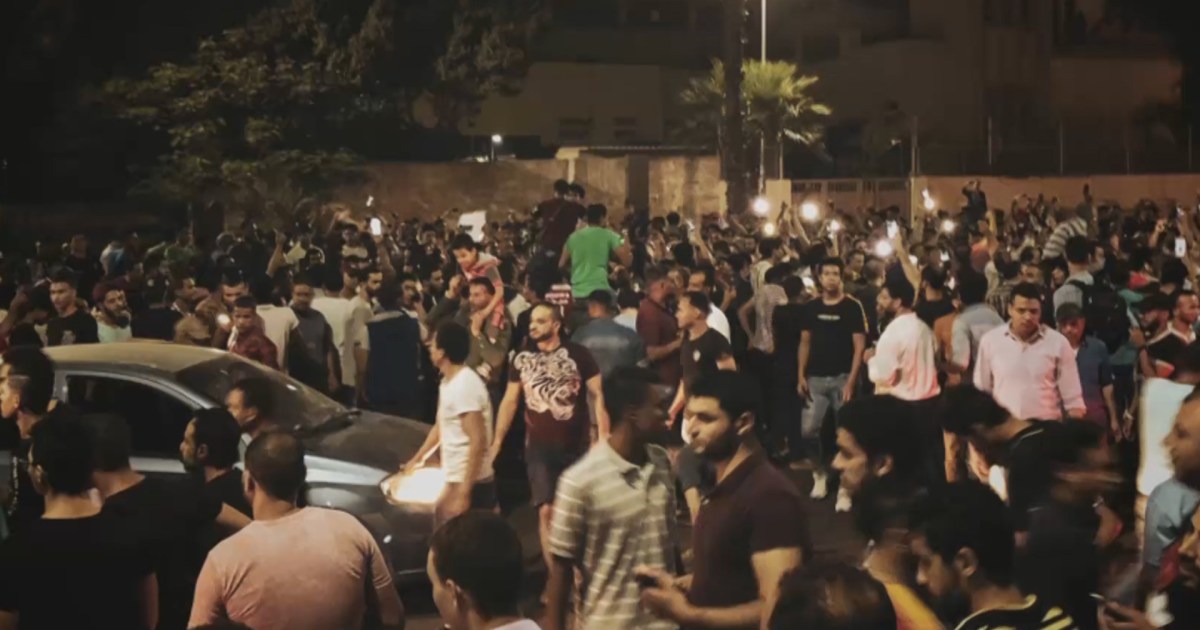Sources from the cities of El-Saf, Atfih, and Al-Ayat, south of Cairo, said that the police imposed a curfew, starting at 7 p.m. tonight, to control the situation in the wake of violent night protests since September 20.
According to Al-Jazeera Net correspondent Abdullah Hamed, the curfew decision was not announced by the Ministry of Interior in an official statement, as usual, but the local police leaders were the ones who told the people about it.
The correspondent added that the police had arrested a number of residents of the villages and regions in which the demonstrations took place, and pages and electronic committees affiliated with the authority published photos of arrested youth and men that they said were behind the outbreak of the demonstrations.
Actor and businessman Mohamed Ali broadcast this evening videos on his private account showing protesters going out in night demonstrations in Egyptian regions, including the village of Al-Kadal in Minya and Fayoum.
Sources reported to Al-Jazeera that the Egyptian authorities have arrested more than 200 people pending investigations into the two-day demonstrations.
Lawyer Khaled Ali revealed that some of those arrested by the security authorities during the past two days have been investigated by the State Security Prosecution since Monday until dawn today Tuesday.
The lawyer added, in a post on social media, that the Public Prosecution decided to detain the detainees for 15 days pending investigation.
The police forces clashed with the demonstrators during the past two days, which resulted in the burning of a number of police cars in areas in the south of Giza and Cairo governorates.
Yesterday, the police forces cordoned off the village of Al-Kadaya, which witnessed the spark of protests, and citizens managed to overturn a police car and set it on fire, while the scene was repeated in a number of villages and regions in Upper Egypt, including the village of Hawarta in Minya Governorate in the south.
The actor and businessman Muhammad Ali had called on the Egyptians to continue demonstrating, starting at 6 pm, earlier than the previous date in which he called to demonstrate, which was nine in the evening.
A number of Egyptian governorates and its countryside have witnessed thousands of citizens protesting during the past two days, and the areas of Shubra, north of Cairo, Al-Basateen and Maadi in the south have witnessed demonstrations and hit-and-run operations between the demonstrators and the police.
The demonstrations extended to the cities of Aswan in the far south of Egypt, as well as to the governorates of Qena and Assiut in Upper Egypt, and Qalyubia and Alexandria in the north.
The local media ignored the coverage of the demonstrations, while the announcers of official satellite channels owned by companies affiliated with security services and businessmen close to the regime said that the demonstrations are limited, and that Egyptian satellite channels abroad deliberately amplify them.
These demonstrations followed decisions to remove and demolish buildings that the government said were built in violation of building codes, and the government imposed heavy fines for reconciliation to avoid home demolitions, while several villages witnessed confrontations between angry residents and the police forces in charge of carrying out the demolitions during the current month.
And press reports talked about the existence of a state of tension and muffled anger among the Egyptians because of decisions to raise the prices of transportation, fuel and electricity, successively, with steady incomes.
A group of Egyptian political forces, bodies and personalities said that the street movement is a prelude to a wider movement and a major uprising sweeping Egypt, as she put it.

